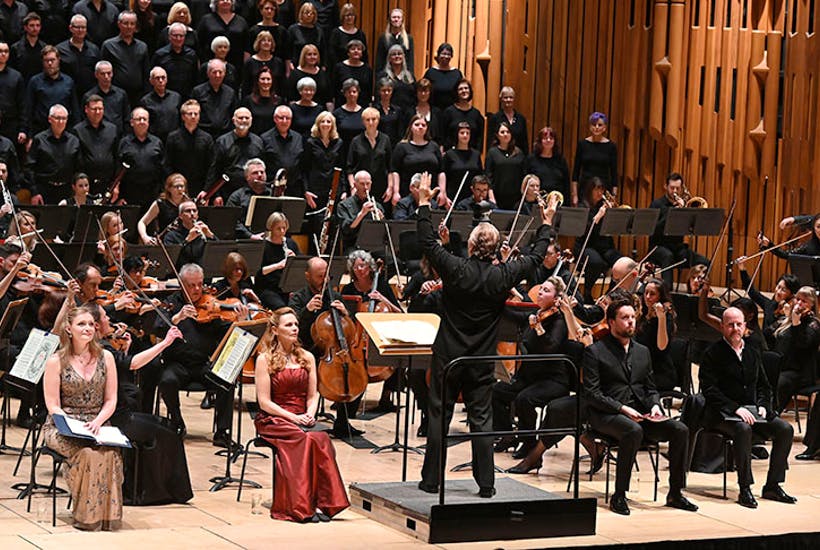Beethoven wears a feather boa and pink shades. He wrangles an electric guitar. A red lightning flash streaks across that familiar, scowling face. ‘Genius before Elton. Radical before Prince. Iconic before Bowie’ proclaimed the posters for the Barbican’s Beethoven Weekender, and apparently there’ve been complaints about them, which probably means that they’ve got the tone about right. Two hundred and fifty years after his birth, Beethoven still has a way of driving all the right people round the bend. US campus musicologists have called for his music to be suppressed (you’d think that champions of inclusion would support a year-long celebration of a disabled composer, but it seems not. Wrong chromosomes). Last month, EU groupies tried to co-opt him to the Remain cause and ended up putting the permatanned Dutch cheesemonger André Rieu at number one, in a slightly unfortunate self-own.
The brilliant thing about the Beethoven Weekender was that it felt like a proper celebration. Children were running about, musicians wandered round playing scraps of symphonies, and clusters of people formed around the posted schedules of events. What to try next? Simon Callow reading extracts from Beethoven’s letters, accompanied by the Carducci Quartet? Matthew Herbert’s sonic installation playing 30 different recordings of the Ninth Symphony simultaneously, in a weirdly consoling wash of sound? I’m still quietly gutted that I had to choose between an orchestral performance and Ah, Ludwig!: in which the 1970s cartoon, Ludwig, about a sentient, Beethoven-loving egg was accompanied by a live soundtrack from the Guildhall’s electronic music department.
Beethoven still has a way of driving the right people round the bend
But ultimately, there’s no ignoring the man himself, and god, it felt good to hear from him: the genius of geniuses; the definitive, unapologetic Great Composer, roaring back like the apex carnivore he is. The centrepiece of the Barbican Weekender was a two-day cycle of Beethoven’s symphonies performed, in an inspired bit of programming, by a relay of orchestras from around England, each conducted by its own music director. In our perpetual, po-faced musical Veganuary of Max Richter and unaccompanied Bach, this was like a grill stacked with prime emotional sirloin: charred, succulent, and oozing with bloody, lived human experience. The hall was packed. The crowd looked diverse, and after each performance they jumped to their feet and yelled. There was an appetite here, and it was handsomely met.
As for the interpretations, it was noticeable how, in 2020, ideas pioneered by the period instrument movement have entered the mainstream. In the Second and Fourth symphonies, Mirga Grazinyte-Tyla’s City of Birmingham Symphony Orchestra deployed valveless trumpets and bowl-like period timpani. Lars Vogt and the Royal Northern Sinfonia, playing the Seventh and Eighth symphonies, just went with the timps. These choices made a particular impact in Beethoven’s explosive tuttis. The period trumpets have a brusque, stabbing quality, and as for the drums: well, instead of the usual rumble of thunder, imagine a volley of musket fire. Both of these conductors asked their string players to dispense with vibrato for long periods, and all three of the orchestras I heard (including Sir Mark Elder’s Hallé in the Ninth Symphony) divided their first and second violins either side of the stage.
Beyond these decisions, the individual performances were as characterful as their conductors. Grazinyte-Tyla’s Fourth Symphony was as lithe and purposeful as a wildcat poised to pounce: eyes shining, muscles taut, living in the moment with only occasional woodwind solos set free to evoke that very Beethoven sense of limitless worlds elsewhere. I heard it in Birmingham, ahead of the London performance, which might be why Vogt and his team initially sounded a little inhibited by comparison. The Royal Northern Sinfonia was the smallest of the five orchestras, and the Barbican acoustic at times almost erased the sound of its cellos and basses. But they had a singularly sweet and articulate woodwind section, and Vogt brought such intense, focused energy to the finale of the Seventh that the audience’s cheers felt like an entirely natural discharge of tension.
In the Ninth, that most abused of masterpieces, Elder let his operatic flag fly — not by forcing the emotion (in fact, the first movement had an almost Stravinsky-like objectivity), but in the way he paced the choral finale, letting it unfurl in a single long-range span while letting individual phrases speak and sing. The audience shouted for more, the hall cleared, and at 9 p.m. we headed back in for one last event: Matthew Herbert’s Beethoven NEIN!, in which massed singers, by electric candlelight, sang a massively slowed-down arrangement of that same finale, dimming into silence amid chattering smartphones until only the famous melody remained. The audience chuckled; the performers smiled. It felt tender and humorous after a breathless weekend. Then I read the programme note: no, apparently it was meant to be a bleak comment on ‘the current political climate’. And with a clunk, Beethoven left the building.






Comments